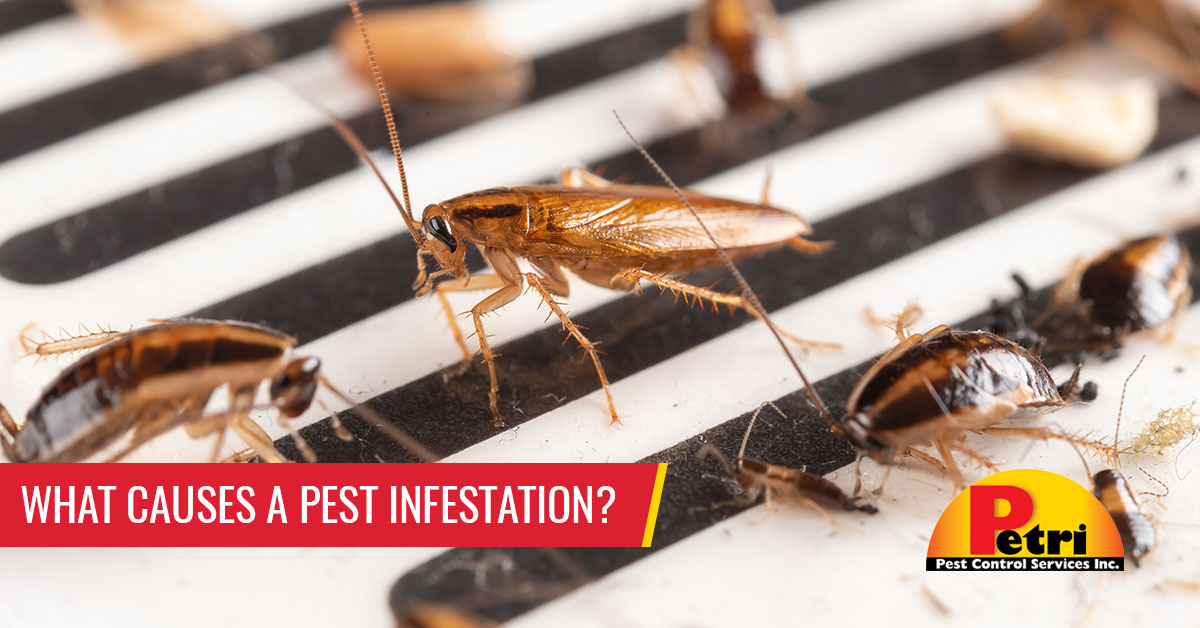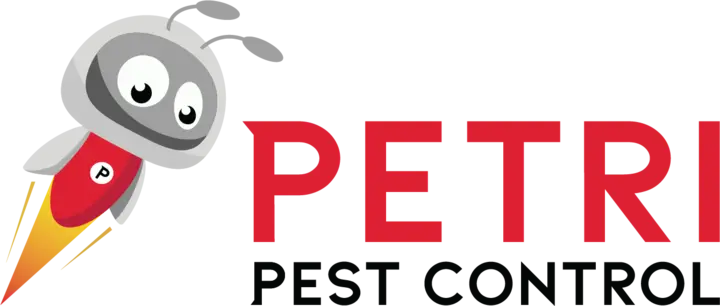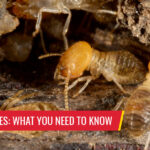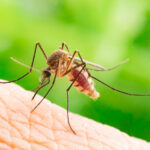
The dictionary defines an infestation as “the presence of an unusually large number of insects or animals in a place, typically to cause damage or disease.” However, most health departments, especially when it comes to public schools, healthcare facilities, and foodservice businesses consider one or more roaches a call to action, as just one roach can cause an asthma attack in a sensitive individual. The tough thing about household pests is that you often won’t notice them until there’s an infestation underway which begs the questions, what causes pest infestations? Why are pests so attracted to your home and what can you do about it?
What causes a pest infestation?
Pests are attracted to your home for several reasons, including:
- Seasonal changes
- Weather changes
- Food and/or water shortages
- Loss of habitat
In many areas, natural habitats are disappearing as more land is converted to business and residential use. Pests have the same basic needs as we do (i.e., food, water, and shelter) and our homes satisfy these needs quite well. So, when the weather changes, the water dries up or food sources have been displaced or destroyed, your house looks pretty good to a number of household pests including ants, termites, roaches, rodents, and others.
What’s so attractive about your home for pests?
As the weather continues to heat up across South Florida, we can expect to see an influx in the pests around our homes and businesses. Why are these pests so attracted to our homes? Consider the reasons below.
Easy access to shelter
When the weather turns chilly or when there’s too much rain, pests seek shelter indoors. Pests can squeeze through small holes, cracks, and crevices in your foundation, around windows and doorways, through plumbing, sewer lines, and drainpipes. Remember those cardboard boxes you’re saving in the attic or garage? Roaches love to grow families in them and rodents love to use them as nesting materials. When rodents live in your attic, garage or inside your walls, they also attract roaches, flies, and other feasting insects that are found near rodent droppings.
Food available at multiple convenient locations
Rodents, who are nocturnal can live for months on mere crumbs not cleaned up after a snack. Pet food bowls may as well be a late-night buffet at a casino, as they offer a smorgasbord of food for rodents and their young. Food scraps and dishes left in the sink after meals or allowed to pile up over a few days offer a “best day ever” for roaches and rodents.
Water in abundant supply
Pet water bowls, standing water, and of course, that persistent drip from the leaky faucet in your bathroom are like water parks to household pests. Termites are more likely to enter your home if they can chew through damp wood leading into your home. Most insects need only a small amount of water to live on for months. Drywood termites don’t need an outside water source, they have adapted their digestive systems to extract water from the wood they eat, which is deposited as “frass” that looks like sawdust but are barrel-shaped pellets and a tell-tale sign of drywood termite activity.
Pests that Commonly Cause Pest Infestations
In South Florida, there is a wide array of common pests found in homes and businesses but we’ve narrowed down the pests that most commonly cause pest infestations.
- Drywood Termites – Because termites may go unnoticed for a while…when you do notice signs of damage, you’ve likely got an infestation underway. Drywood termites can be treated with traditional tent fumigation but in some cases, it can also be treated with a no-tent solution. Signs of drywood termite infestations include:
- Hollow sounding walls, doors, fascia, and floors
- Surfaces that look water damaged and/or buckled
- Surfaces that you can push a sharp object through easily
- Tan to dark brown hard pellets left behind the resemble coffee grounds
- Asian and Formosan subterranean termites – You might need to look outside your home to see signs of subterranean termite activity, although Asian and Formosan subterranean termites are so aggressive with large colonies that visible structural damage can occur in half the time it takes native subterranean termites to inflict serious damage to the integrity of your home. These voracious intruders live in the ground near your home. Mud tubes act as superhighways for worker termites to transfer wood from your home to feed millions of mouths in the nests below ground. Signs of Asian and Formosan termite infestations include:
- Swarming indoors
- Discarded wings left from swarming reproductive termites
- Mud tubes that are tunnels running up trees or the side of your home
- Mud or dirt found in holes in walls or in attics where damage may be found first
- Rodents – Rodents running around your kitchen in the middle of the night can leave droppings and footprints. Other signs you should keep an eye on:
- Scratching sounds in your walls
- Scurrying sounds in your attic
- Actual rodents sighting
- Roaches – Roaches aren’t social beings; they pretty much follow what other roaches are doing. They do not like light so when the lights come on and you see them scatter, you know you’ve got an infestation. Roaches like warm, dark places, like under your fridge, in cabinets, and cardboard boxes in your attic or garage. Even one roach sighting should be enough to cause you to vigilant about roaches in your home.
- Ants – Most South Florida ants are nuisance ants except for imported fire ants, carpenter ants, and a few other non-native ants. The big problem with ants is that the ones you see foraging in your kitchen are only scouts. The majority of ants live in nests outside your home, making them difficult to get rid of on your own. A professional pest control company such as Petri Pest Control Services whose trained and licensed technicians know where to strategically place baits so that the workers carry the bait back to the nest or nests and eliminate the queen.
For most household pest infestations – It’s a good idea to go with the pros
While some South Florida pest situations may be resolved temporarily by DIY (do-it-yourself) products, most require materials that aren’t available to the public. Petri Pest Control Services’ certified and licensed technicians have been trained to first inspect to determine what specific pest is causing the problem and what conditions may be contributing to the pest infestation (excess moisture, food, harborage, etc.). The Petri technician may then strategically place baits and other EPA approved products and materials to control and eliminate the pest infestation. Because rodents, roaches, and flies carry pathogens that pose health threats to you and your loved ones, it’s important to eliminate these pests as soon as possible. Termite infestations need to be handled by a professional pest control company because termite damage can potentially cause serious damage to the structure of your home. Petri Pest Control Services offers pest protection programs, treating the perimeter of your home or property to seal out pests. With Petri’s Sentricon Colony Elimination System we are able monitor and protect your home or business from subterranean termites year-round.
At Petri Pest Control Services, we’ve been in the business of offering full-service pest control solutions since 1956 and understand the urgency of handling pest infestations quickly. Serving Broward and Palm Beach Counties from our locations in Boynton Beach and Pompano Beach, when your South Florida home requires professional pest control solutions – contact Petri to schedule a free pest inspection!
What Causes A Pest Infestation? What Makes Your Home Attractive To Pests? in South Florida
Serving Broward County and Palm Beach County


